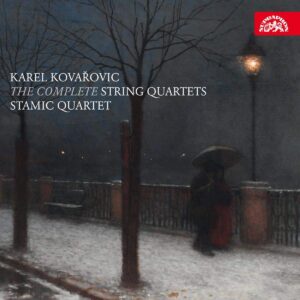A composition pupil of Zdenek Fibich, Karel Kovařovic (1862-1920) was the director of the Prague National Theater who (in)famously turned down Janácek’s opera Jenufa for production. Many years later he changed his mind and offered Janácek a production, but only if the composer would accept Kovařovic’s cuts and tweaks. History, of course, has vindicated Janácek’s startling originality. Kovařovic’s musical language, by contrast, looks backward and recedes into anonymity.
His first two string quartets are essentially lightweight Dvořák, minus memorable tunes and rhythmic intensity, although the string writing itself reveals a modicum of technique and contrapuntal skill. The Third Quartet, however, is a different story altogether. The Scherzo’s asymmetry and unconventional harmonic twists grab your attention, while the Adagio’s sustained dark mood is enhanced by particularly beautiful passages for the viola and cello. A pity this work remained unfinished.
As always, the Stamic Quartet members channel their formidable individual personalities toward equally strong ensemble values, and make the best possible case for these works. One must credit the Stamic Quartet for championing unusual repertoire, but their Gubaidulina, Klusak, and Foerster quartet cycles offer greater musical rewards overall.
































